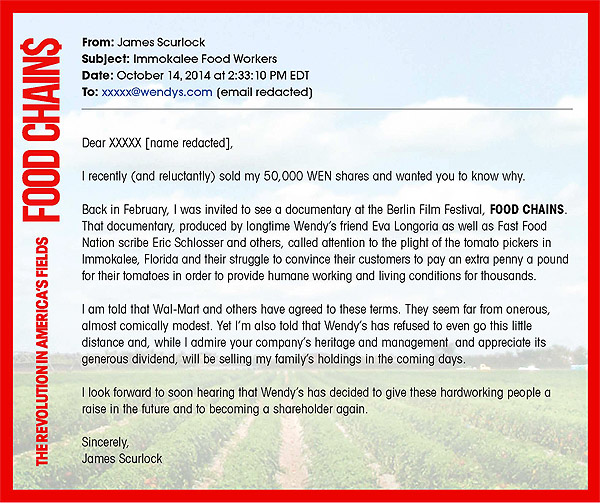[hupso title=”#Divestment? Now there’s an interesting idea for a campaign… @Wendys @FoodChainsFilm @FairFoodProgram” url=”https://ciw-online.org/blog/2014/10/divestment/”]

The exciting new documentary “Food Chains” is having an impact even before it’s released, prompting one Berlin Film Festival goer to divest 50,000 shares in Wendy’s after seeing the film…
Well this was a surprise. And a thought-provoking one at that.
This week, news reached the CIW via the “Food Chains” crew that a certain Mr. James Scurlock had written to inform them that he had decided to sell his family’s holdings in Wendy’s until the hamburger giant joins the Fair Food Program! Apparently, Mr. Scurlock had attended the big “Food Chains” premiere in Berlin last February and was so moved by the film and the workers’ story that he sold his shares — 50,000 of them! — and then wrote the above email to the company to explain his decision.
And it turns out that Mr. Scurlock isn’t just any investor. He is a Ridenhour Prize-winning journalist for his 2007 book Maxed Out: Hard Times in the Age of Easy Credit, reporting on the impending financial crisis before it happened, and a respected documentary maker in his own right. So it’s not surprising that he came up with what could be an interesting new twist on the Wendy’s campaign.

Divestment as a form of protest has a long and proven history as an effective tool of social change. A recent discussion on divestment in the New York Times (below), written by Bill McKibben of 350.org, reflects on the utility of divestment as a tool in the climate change movement. It is worth quoting in its entirety:
Students on 210 campuses are now pushing for fossil fuel divestment — the Nation, which keeps track of such things, wrote that the campaign was “engaging more students than any similar campaign in the past 20 years.”
One reason why is simple morality — if it’s wrong to wreck the climate, then it’s wrong to profit from the wreckage.
But we don’t have time for purely symbolic measures. The divestment movement is also growing because people sense its potential power. After 25 years of watching scientists and economists explain futilely to politicians that we need, say, a price on carbon, we know the source of the problem: the fossil fuel industry has a hammerlock on Washington and other capitals. We need to loosen their grip.
Divestment won’t do this by directly affecting share prices, at least in the short run — these companies are the richest enterprises in history. Instead, as the country’s colleges, cities and denominations begin to cut their ties, we’ll start to revoke the social license of these firms. Many of the nation’s elites sit on college boards, forcing them to grapple with the fact that the fossil fuel industry is now an outlaw against the laws of physics.
To understand ‘’social license,’’ consider that Philip Morris was once a respectable company, able to win political battles; tobacco divestment at places like Harvard was one of several tools that helped erode their power. Or consider South Africa in the 1980s — Nelson Mandela credited American divestment as one key to its liberation, not because it bankrupted companies, but because it started to make them pariahs. (Desmond Tutu has called for fossil fuel divestment, citing the suffering of Africans from climate change).
Would it still be effective? Here’s Jon Huntsman, a Republican and former governor of Utah, reddest state in the union, on the metastasizing divestment movement. “I think it’s a good thing, and I can tell you, as serving on some big corporate boards, that when things like that happen, it’s taken seriously.”
This can be done at very low cost to colleges — one research report makes clear that the theoretical risk to return is 0.0044 percent, and the planet’s biggest actuarial association warned this week that, by contrast, environmental risk had been underweighted by investors. Divestment alone won’t solve global warming — nothing alone will. But it’s one powerful way to exert some leverage.
“It’s one powerful way to exert some leverage.” Now that’s food for thought.
Wendy’s continues to resist joining a program that is not only widely recognized as the most effective program for the protection of human rights in the country today, but one that all its major competitors have already joined, meaning the company is actually deriving a competitive advantage from farmworker poverty in its supply chain. At this point, four years into the wildly successful implementation of the Fair Food Program and fourteen years since the launch of the Campaign for Fair Food, Wendy’s resistance is simply unconscionable.
Escalation of the campaign is not only justifiable, but obviously necessary. And the same constituencies that led the successful divestment campaigns of the past — students, faith communities, and activist shareholder groups — are already vital cogs in the Campaign for Fair Food.
Is Mr. Scurlock’s admirable gesture a shot across the bow of the hamburger giant? Will “Food Chains” inspire more action like Mr. Spurlock’s divestment as it hits theaters, universities, and places of worship across the country this November? Stay tuned…
